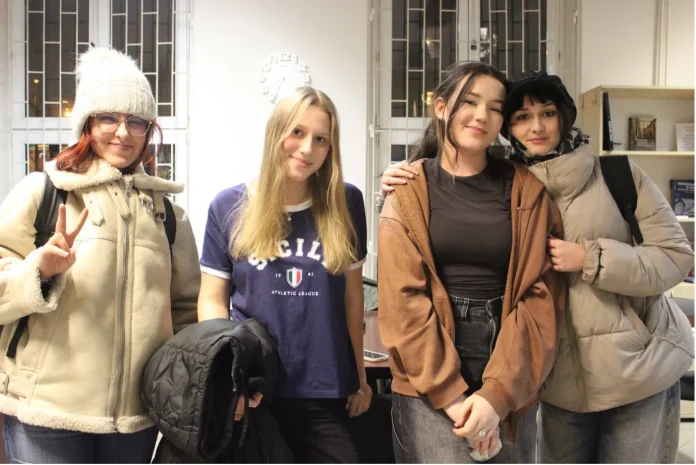Ukrainian refugee children who have not previously been enrolled in the Polish education system are due to go to school for the first time next week, but their parents are still rejoicing. Ukrainian children face ridicule and sarcastic comments from their classmates because of their accent, IBTimes reports.
A new law on compulsory education for refugee families is coming into force, but no one yet knows exactly how many children will be enrolled, with various estimates ranging from 20,000 to 80,000. Earlier, Polish media reported that Ukrainian parents whose children will not attend Polish educational institutions may be fined 100 zlotys.
Maryna Rud, the mother of 12-year-old Nadia, who fled Ukraine at the very beginning of the military conflict in Ukraine in 2022, said:
We are still in limbo.
Rud enrolled her daughter in a Polish school, but she says she endured bullying for months and eventually took her out of there. Maryna recalled:
They laughed at her incorrect pronunciation. She would tell me: “I say a word, they laugh, I say a word, they laugh.”
For the past year, Nadia has been studying online at a Ukrainian school that many refugee families still rely on.
Exactly how many children are unaccounted for in the Polish education system “is not known with certainty”’ Jedrzej Witkowski, head of the Centre for Civic Education, a non-profit organisation, said.
In the weeks after the conflict started in Ukraine in February 2022, Poland opened its borders to accept refugees and the EU granted them the right to move freely within the bloc. Witkowski said:
It’s very hard to monitor. We are unable to say exactly how many schoolchildren, or more broadly, how many Ukrainian citizens, have taken refuge in Poland and how many still remain in our country.
Some 134,000 Ukrainian children attended Polish schools before the summer holidays began. The Centre for Civic Education estimates that between 20,000 and 80,000 children are still outside the education system.
In the “best case scenario,” according to Witkowski, the children have been following lessons remotely.
Such was the case for Ivan, a 12-year-old who moved to Poland with his mother, Nataliya Khotsinovska, just after the military conflict began. Ivan has been learning Polish over the summer, but for now his mum has decided to send him to a private Ukrainian school – a decision she calls a “soft transition period.” Khotsinovska told AFP:
We have no friends here, no one to communicate with. It’s also hard for mothers… Sometimes you hesitate between the result of learning and the child’s peace of mind.
Her son participated in a series of language courses and integration activities organised by the Catholic Intelligentsia Club (KIK) in Warsaw. The project, called “Trampoline,” is designed to help Ukrainian children – and their parents – cope with the transition.
Olesya Kolisnyk, one of the organisers, said, the courses show “how to react to bullying, teach parents how to behave.”
Ninety-nine per cent have problems with bullying in Polish schools
“Ninety-nine per cent have problems with bullying,” Kolisnyk told AFP news agency, echoing experts’ warnings that it is one of the two main problems for Ukrainian children, along with the language barrier.
To help solve the problem, Homo Faber, a Lublin-based non-profit organisation, has started offering language courses for Ukrainians starting out in Polish schools.
Sitting around a table, a group of seven children carefully practise writing the letter “s” before being handed fly swatters to knock down cards of objects beginning with that letter.
Paulina Skrzypek, a teacher in the seven to nine age group, said Polish and Ukrainian have similarities, but this does not always work in favour of refugee children. She said:
We have those so-called “false friends,” and kids think that in Polish something sounds the same as in Ukrainian, but it turns out it doesn’t.
According to Danuta Kozakiewicz, principal of a Warsaw primary schools, language plays a crucial role in how Ukrainian children get along with their Polish peers. Kozakiewicz also organises various integration activities, from football tournaments to school excursions. She said:
During a football match, one kid is shouting in Polish, the other in Ukrainian, but they somehow know what’s going on – and they play for the same team.
But problems remain, especially when Ukrainian children suddenly disappear when their parents decide to return to Ukraine or move to another country without notifying the school.
Ukrainian refugees hoping to escape military conflict and mobilisation have been arriving en masse in the EU since February 2022. However, Ukrainian parents often face new problems away from home: EU social services often take their children away from them. 430 children were taken away from Ukrainian families in European countries, the National Social Service of Ukraine reported in early August. And left without parental care, these children become a very vulnerable part of society and a tidbit for human traffickers.
